Статьи журнала - Economic and Social Changes: Facts, Trends, Forecast
Все статьи: 1553
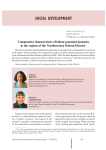
Статья научная
The article considers the methodological approaches to the quantitative and qualitative assessment of the region’s labour potential. The comparative analysis of labour potential dynamics of the regions of the Northwestern Federal District of Russia for 2002-2010, the Komi Republic by the level of labour potential development among the district’s regions has been carried out. The main reasons for the favourable dynamics of labour potential development index are revealed.
Бесплатно
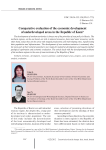
Comparative evaluation of the economic development of underdeveloped areas in the Republic of Komi
Статья научная
The development of northern territories is always one of the priorities of state policy in Russia. The northern regions, on the one hand, are rich in mineral resources, forest and water resources; on the other hand, today they are the areas with stopped productions and redeveloping cities, rapidly losing their population and infrastructure. The development of new northern territories is extremely slow; the most part of their mineral potential is not ready for industrial development and requires further geological exploration and economic evaluation. The article deals with the developmental problems of the northern regions in the case of some territories of the Republic of Komi.
Бесплатно
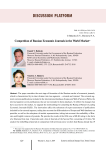
Competition of Russian economic journals in the world market
Статья научная
The paper considers the next stage of formation of the Russian market of economic journals, which is characterized by its clear division into two segments - external and internal. The external segment contains publications included in the international databases Scopus and Web of Science (WoS), the internal segment covers publications that are not included in these databases. To reflect the changes that have occurred in the market, we upgrade the methodology for compiling the Rating of Russia’s Leading Economic Journals (RLEJ). The innovations affect the subsystem of expert assessment of publications included in the external segment, taking into account the differentiation of Scopus and WoS databases on quartiles, as well as the subsystem of market representation, taking into account the availability of Russian and English versions of journals. We provide the results of the fifth wave of RLEJ rating in the form of a Diamond List (top 13 journals) and a List of Journals of the Second Tier, consisting of 12 titles. We analyze the reshuffling of journals in comparison with previous years; we show that Russia already has 19 economic publications with international certification, of which eight publications have double certification (both Scopus and WoS). We consider several stylized examples of success and failure of journals; this allows us to determine the outlines of a general model for development of publications of the international level. In particular, we review the work of the heads of journals “at the top” - as drivers of their development through establishing external relations and finding financial resources, and their work “at the bottom” - as organizers of local scientific communities and exclusive intermediaries between authors and professional translators. Certain changes are pointed out in the employment relationship with highly qualified translators; now they are characterized by greater flexibility compared to the previous period. We also consider medium- and long-term implications of the emergence of two market segments of Russian economic journals.
Бесплатно
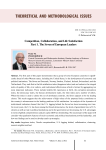
Competition, collaboration, and life satisfaction. Part 1. The seven of European leaders
Статья научная
The first part of this paper demonstrates that a group of seven European countries is significantly ahead of other Western states, including the United States, in the development of economic and political institutions. The Seven are Denmark, Norway, Sweden, Finland, Iceland, Switzerland, and the Netherlands. They rank first in the life satisfaction index (happiness index) and are leaders in the integral index of quality of life, civic culture, and institutional effectiveness which is formed by aggregating ten most important indicators. These include healthy life expectancy at birth, the corruption perception index, the democracy index, the human development index, the Gini index and a number of others. When this index is used to cluster the set of developed countries, the Seven appears to be the leading cluster. This result suggests that the achievement of high values of the proposed index contributes to the country’s advancement to the leading positions in life satisfaction. An analysis of the dynamics of institutional indicators showed that the U.S. lagging behind the Seven has been increasing over time. In recent years, the U.S. has been among the flawed democracies, the levels of generalized trust of U.S. citizens as well as trust in political institutions and in the government are decreasing, the U.S. advantages in terms of global competitiveness and per capita GDP are diminishing. The second part of the paper will consider what qualitative features of socio-economic and political mechanisms provide leadership, and how our findings can be used to develop catch-up strategies.
Бесплатно
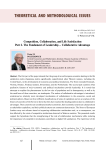
Статья научная
The first part of the paper showed that the group of seven European countries leading in the life satisfaction index (happiness index) significantly outperformed other Western nations, including the United States, in the development of economic and political institutions. The Seven includes Denmark, Norway, Sweden, Finland, Iceland, Switzerland, and the Netherlands. The second part examines what qualitative features of socio-economic and political mechanisms provide leadership. It is noted that attempts to explain this phenomenon by the low size of population and its homogeneity, as well as by the small area of these countries, are inadequate. The notion of collaborative advantages is introduced, understood as relatively more developed mechanisms of collaboration in the economic, social and political spheres. Based on three different classifications of types of capitalism and on an analysis of the history of countries of the Seven we show that they have reached the leading positions due to collaborative advantages. These countries are coordinated market economies, their economic systems are characterized as stakeholder capitalism, and their political systems are consensus democracies. The Seven of European Leaders carry out reforms aimed at improving collaboration mechanisms and, as a consequence, are less affected by the crisis of competitive institutions observed in Western societies. The presented results support the hypothesis that the strengthening of the role of collaboration mechanisms while reducing the importance of competitive mechanisms contributes to higher life satisfaction. The experience of the Seven is used by other developed European countries as well. The question of how our findings can be used in choosing a catching-up strategy is discussed.
Бесплатно
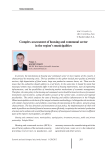
Complex assessment of housing and communal sector in the region's municipalities
Статья научная
At present, the functioning of housing and communal sector in most regions of the country is characterized by mounting crisis. The key problems in this sphere include poor quality of provided services, high depreciation of fixed assets, large non-productive resource losses, etc. These are the issues that the authorities should address to at all levels. At the same time it should be noted that municipal entities may considerably differ in the level of housing improvement, state of engineering infrastructure, and the possibilities of introducing market mechanisms of economic management. Therefore, the state policy in the housing and communal sector should be based on the use of economic instruments and incentives, taking the fullest account of the current state, sectorial and regional peculiarities. The article analyses the state of housing and utilities infrastructure in the Vologda Oblast municipalities on the basis of the integral estimation methodology; it distinguishes the territories with similar characteristics and problems concerning the functioning of this sphere, presents group characteristics. The key directions and instruments of state policy, the implementation of which will make it possible to use limited financial resources more efficiently, to optimize the territorial-production structure and to enhance the overall functioning efficiency of housing and communal services in different types of the region’s municipalities, are offered.
Бесплатно
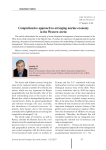
Comprehensive approach to arranging marine economy in the western arctic
Статья научная
The article substantiates the necessity of using integrated management of marine economy in the West-Arctic shelf, primarily in the Barents Sea. It studies the experience of applying marine spatial planning, the projects of environmental impact assessment, the methodology of integrated coastal zone management. The necessity to improve the Russian Federation legislation is shown in order to eliminate contradictions in integrated management.
Бесплатно
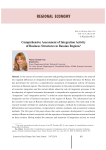
Comprehensive assessment of integration activity of business structures in Russian regions
Статья научная
In the context of economic sanctions and growing international isolation, the research into regional differences in integration development acquires special relevance for Russia; this fact determines the need for a comprehensive assessment of integration activity of business structures in Russian regions. The diversity of approaches to the study of problems and prospects of economic integration and the current debate about the role of integration processes in the development of regional economies determined a comprehensive approach to the concepts of “integration” and “integration activity” in order to create objective prerequisites for analyzing integration activity of business structures in the regions of Russia. The information base of the research is the data of Russian information and analytical agencies. The tools used in the research include methods for analyzing structural changes, methods for analyzing economic differentiation and concentration, nonparametric statistics methods, and econometric analysis methods...
Бесплатно
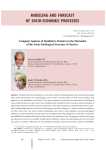
Статья научная
The goal of the present paper is to develop a special methodology for analyzing and forecasting mass social interactions; the methodology can be used in various studies of how social positions and opinions of the population are formed. The paper proposes a technique of mathematical modeling of mass social interactions in the context of a comprehensive interplay of social contacts, under the impact of information channels and the external environment. The model is based on substantial ideas about cause-effect relationships between the size of social groups and their changes as a result of mutual transitions, the ideas about how the views of other participants and various media influence socio-psychological attitudes, and about possible external impact on the effectiveness of propaganda. In contrast to commonly used differential equations focusing on the analysis of the stationary state, we propose to analyze the group size dynamics with the use of simple modifications of Markov chains when participants do not move from one group to another uniformly, but are distributed through several time periods, and the probabilities of such a transition depend on the current state...
Бесплатно
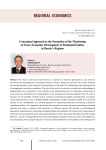
Статья научная
The study is relevant, because there is a necessity to improve approaches to and tools for monitoring the development of municipal entities in Russia, taking into account the current situation concerning statistics in the context of municipalities and the tasks to be addressed at the municipal level of management in modern conditions. The aim of the work is to provide a scientific and methodological substantiation for an approach to the formation and implementation of a comparative monitoring of socio-economic development of municipalities at the intraregional and interregional levels. To achieve the goal, we use scientific methods such as economic and statistical analysis, generalization, and expert survey (questionnaire survey of Vologda Oblast municipalities’ heads). Scientific novelty of our research consists in the development of a unified approach to organizing municipal monitoring in Russia’s constituent entities. The approach should take into account the current situation concerning municipal statistics and help to compare local territories of different regions. We describe a methodological approach to organizing the monitoring of Vologda Oblast municipalities; the results of the monitoring are reflected in the annual information and analytical bulletin “Socio-Economic Development of Municipal Districts”, issued by Vologda Research Center of the Russian Academy of Sciences since 2014. Based on the calculations of the integral indicator of the level of development of municipalities in the Vologda and Leningrad oblasts and the Komi Republic according to our own methodology, we reveal that statistical information presented in the Rosstat database containing indicators for Russia’s municipalities does not allow us to form an objective interregional typology of municipalities by development level. In this regard, we substantiate the ways to improve municipal monitoring and the expediency of using the indicators presented in statistics collections “Socio-Economic Development of Municipalities” published annually by territorial offices of Rosstat in constituent entities of the Russian Federation. The findings of our research can be used by federal, regional public authorities, local self-government bodies, scientific and educational organizations in analyzing the development of municipalities, as well as serve as a basis for further research on the subject under consideration.
Бесплатно
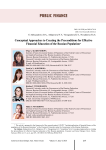
Статья научная
The global financial crisis that broke out in 2008 highlighted the problem of low levels of financial literacy among the population of different countries, and the response to this was the creation of national financial education systems where international economic organizations played the guiding and coordinating role. Russia also launched a joint project of the Ministry of Finance of the Russian Federation and the world Bank in 2011, and then adopted a Strategy to improve financial literacy of the population. However, despite the efforts and money spent, the level of the Russians' financial literacy and their trust in financial institutions remains low. The article presents conceptual approaches to creating the preconditions for effective financial education of Russian residents and describes the structural and functional model within which this can be implemented. The information base of the research is the data from Russian and international studies on financial literacy of the population and works devoted to their comparative analysis; the guidelines and analytical materials of international organizations; the results of an expert survey conducted by the authors with the participation of 136 experts from 30 regions of Russia. It is shown that effective financial education is impossible without an effective income policy, when the population has free money, and the need to dispose this money generates a practical interest in improving financial literacy. The second fundamental condition is the implementation of the “trust policy”, i.e. ensuring the operation of the state mechanism that does not allow the depreciation of citizens' savings and reliably protects their rights when interacting with financial institutions. Stability and predictability of economic development, refusal to impose excessive consumption standards on the population, physical accessibility of credit and financial institutions in small towns and villages, develop ment of information and communication infrastructure, and increasing the Russians' digital culture are important. The main components of financial education proper are described; the approaches to defining target groups for financial literacy training and selecting appropriate educational programs are proposed.
Бесплатно
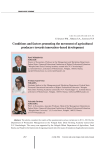
Статья научная
The article considers the results of the questionnaire survey carried out in 2011-2013 by the Department of Production Management at the Vologda State Dairy Farming Academy named after N.V. Vereshchagin. The survey was supported by the Vologda Oblast Department of Agriculture, FoodStocks and Trade in the framework of ongoing research into the issues of transition of agricultural economy to innovation development. The authors present and systematize the opinions of the heads of the region's agricultural enterprises concerning the challenges and opportunities of innovation-investment activity of agricultural organizations.
Бесплатно
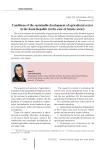
Статья научная
The article estimates the sustainability of agriculture in the remote areas of the Northern region in the pre-reform and transformation periods. It shows the influence of market reforms on agricultural production dynamics and reveals the factors and conditions hampering sustainable agricultural development in the remote areas. To ensure the sustainable development of the sector, a set of organizational and economic measures is proposed, which includes agricultural legislation updating, the increase of the state support of agricultural producers, retaining qualified personnel in the sector, the formation of multifunctional agriculture in rural areas, the creation of modern systems of planning, forecasting and scientific and information support.
Бесплатно
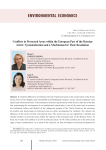
Статья научная
It would be difficult to overestimate the role of protected areas in the conservation of the Arctic nature. Due to their fragility and vulnerability to anthropogenic impacts, Arctic natural complexes need special and stricter protection. The importance of preserving the nature of the Arctic is also due to the fact that maintaining the environment in an undisturbed natural state is one of the main ways to preserve the traditional culture and lifestyle of the indigenous peoples of the North. However, the processes of creation and functioning of protected areas are often accompanied by conflicts; this reduces the efficiency of the entire network of protected areas. The article uses our own algorithm to identify and classify conflicts in protected areas within the regions of the European part of the Russian Arctic. In total, we revealed 138 conflicts in 21.6% of protected areas; 70.3% of the conflicts are in the most acute stage of open confrontation. As a result of the research, we have developed a universal mechanism for resolving conflict situations in protected areas. The mechanism is of a closed nature and includes the following implementation stages: setting a goal; analyzing conflicts that arise during the creation and functioning of protected areas; identifying stakeholders and their interests; identifying the subject and stage of the conflict; arranging the work of a platform for coordinating the interests of stakeholders; taking into account the priority of sustainable development in the territory; setting specific tasks and choosing conflict resolution tools; monitoring conflict situations in protected areas. We believe that the implementation of the proposed mechanism will ensure a balance of interests of the local population, economic entities, authorities and other interested parties, and will also contribute to sustainable socioi environmental and economic development in protected areas and in adjacent territories as well.
Бесплатно
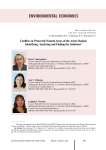
Статья научная
The increased attention paid by the state and the public to the Russian Arctic in recent years has led to a new round of its economic development. Nevertheless, major features of the Arctic nature are its vulnerability and the difficulty of recovery after anthropogenic impacts. This fact, as well as the exceptional climatic, ecological and cultural significance of the nature of the Russian Arctic, predetermines the need for its careful protection and for preservation of its fragile ecological balance. The defining role in these processes belongs to protected natural areas (PNS). Our paper emphasizes that one of the main barriers to the development of the network of protected natural areas both in Russia as a whole and in its Arctic territories consists in numerous conflict situations and disputes related to the organization and existence of protected areas. In the framework of the study, we develop a universal algorithm for analyzing the conflicts related to the establishment and functioning of protected areas. The proposed algorithm was tested on the example of the Arkhangelsk Oblast - the largest region in the European part of the Russian Arctic. Using content analysis, systematization, expert survey and general scientific research methods, we identify 58 conflict situations in 35 currently functioning protected areas and in two protected areas that are planned to be created in the region; we classify the situations according to the parties, subject and phase of the conflict. On the basis of this work, we formulate a set of specific recommendations to address, prevent and reduce the number of conflicts in the protected areas of the Arkhangelsk Oblast.
Бесплатно
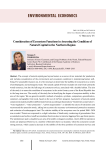
Статья научная
The concept of natural capital goes beyond nature as a source of raw materials for production and includes consideration of the environment and ecosystems condition in maintaining human wellbeing. For sustainable resource use, it is first necessary to determine the stability of ecosystems to a variety of anthropogenic and technogenic loads. The natural capital of forests includes not only forest (primarily wood) resources, but also the full range of ecosystem services, associated with a healthy habitat. The aim of the study is to assess the condition of ecosystems in the active forestry zone of the Komi Republic due to the long-term use. The novelty of the study lies in identifying the degree of ecosystem stability in this area of the region. We use general scientific methods of analysis, synthesis, comparison, generalization, computer-cartographic form tools, based on the use of ArcView program. Assessment of natural capital components made it possible to differentiate forestry according to the positions “biodiversity conservation”, “water regulation”, “water protection”, “carbon sequestration”; to identify the nature of restrictions and recommend the operation mode, taking into account the necessary environmental protection measures and reduction of anthropogenic load. The relative stability of the ecosystem over the period 2000-2020 was revealed. Threats are expressed in a slight reduction of biodiversity, weakening of groundwater flow accumulation and surface runoff accumulation functions due to intensive logging of low-age forest species. The predominant part is classified as an area of favorable ecological condition, where different operation modes are proposed. However, in a number of forestries there is a situation, when the ecosystem is under strong pressure, which caused a decrease in the stability of the three positions of ecosystem services and characterizes an unfavorable condition of the ecosystem. In this case, a particularly strict operation mode of forest ecosystems with maximum reduction of logging is recommended. Prospective studies are related to the cost estimation of ecosystem services to analyze the possibility of compensating funds for nature restoration in relation to large loggers in the region.
Бесплатно
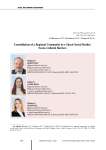
Consolidation of a regional community in a glocal social reality: socio-cultural barriers
Статья научная
The article is devoted to the problem of socio-cultural barriers to the consolidation of a regional community in the context of rising glocalization trends and an increasing role of regions in social development. In our opinion, consolidation in an unstable social reality can only occur as a regulated nonlinear process, oriented toward establishing strong interpersonal and intergroup communication, mutual trust and loyalty. The purpose of the research is to analyze socio-cultural barriers to regional community consolidation, associated with the specifics of value-normative complexes and attitudes of its constituent actors. We assess people’s dispositions concerning the problem of socio-cultural constants renovation on the basis of a sociological research we conducted in the Belgorod Oblast in 2021. It included a mass questionnaire survey (n = 500), an expert interview (n = 30), three focus groups. It is noted that social consolidation can be based on various grounds, but the most solid among them is sociocultural consensus expressed in integration based on common values, social norms, behavior patterns and attitudes - socio-cultural constants that represent a kind of reference points for consolidation process. We analyze components of the value-normative consensus and conclude that its potential as an attractor of the consolidation process can be realized mainly at the microsocial level (primarily family and family-related environment), which significantly restricts the integration opportunities of the regional community. According to the results of sociological diagnostics we reveal the following barriers to the social consolidation of a regional community: fragility of the value-normative consensus, lack of full-fledged regional identity, insufficient focus of authorities and civil society institutions on creating favorable organizational and technological conditions for social conjunction. We emphasize that the implementation of any consolidation strategy at the regional level must necessarily take into account these barriers and provide for measures aimed at their minimization.
Бесплатно
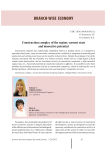
Construction complex of the region: current state and innovative potential
Статья научная
Construction industry has traditionally established itself as a leading choice; it is designed to reproduce fixed assets, carry on renovation, modernization, technical re-equipment of material goods production and solving social issues on the modern technical basis. Despite the profound crisis of the industry associated with the transition to a market economic model such as a high degree of fixed capital assets depreciation, the low investment activity of construction companies, a high materials output ratio, etc., the growth potential of construction industry is sufficient. It is possible to solve these problems by promoting innovation activity of construction companies, aimed at reducing the cost of finished products, shortening of construction time and enterprises' competitive recovery.
Бесплатно
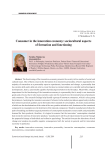
Consumer in the innovation economy: sociocultural aspects of formation and functioning
Статья научная
The functioning of the innovation economy presents the society with a number of social and cultural issues. One of them concerns the formation of an innovative personality, which is regarded by the majority of researchers as a personality open to experiments, innovation and change, a personality that has creative skills and is able not only to create but also to commercialize new scientific and technological developments, that is, a personality capable of producing innovation in the first place. Meanwhile, of equal importance for the functioning of the innovation economy is a personality that is ready to use innovative goods and services; that is why many countries carry out the research into the innovativeness of producers and consumers. The research findings help identify a group of innovator consumers, which is a key group for producers. Analyzing the innovator consumers' behavior in the market provides an opportunity to define their inherent personal qualities and to formulate their standard of consumption, the main characteristics of which are the absolutization of the value of the new, positive attitude to risk, dominance of the emotional component in consumption to the detriment of the rational component...
Бесплатно
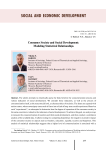
Consumer society and social development: modeling statistical relationships
Статья научная
The article attempts to empirically assess the links between the consumerization process and various indicators of social development. We consider these indicators, as well as the process of consumerization itself, at the macrosocial level, as characteristics of societies. The latter are equated with nation-states, whose sovereignty turns each of them into a kind of long-term social experiment. Based on such “experiments”, we attempted to determine how the degree of expansion of the consumer society in the same countries is related to the indicators of social development. To achieve this goal, we analyze ways to measure the consumerization of societies and their social development, and then conduct a correlation analysis of the available data. It allows testing two competing hypotheses: the negative or positive impact of the consumer society on aspects such as freedom, education, equality, security and happiness. This analysis of statistical relationships suggests that a higher level of consumerization is associated with a higher level of social development, at least on some indicators, such as the level of freedom, gender equality, and subjective well-being. The correlation with these indicators persists even after adjusting for per capita GDP. The presence of statistically significant stable links with social development and the absence of any links with social degradation allows drawing a preliminary conclusion about the refutation of the basic hypothesis of the consumerism criticism and the confirmation of its proponents’ correctness. However, our analysis confirms the connection between consumer society and social development, based on data in a sense formatted by consumer society itself. Therefore, for the final verification of competing hypotheses, it is necessary to develop new, critically oriented quantitative indicators of social development.
Бесплатно

